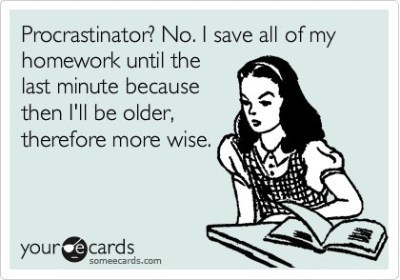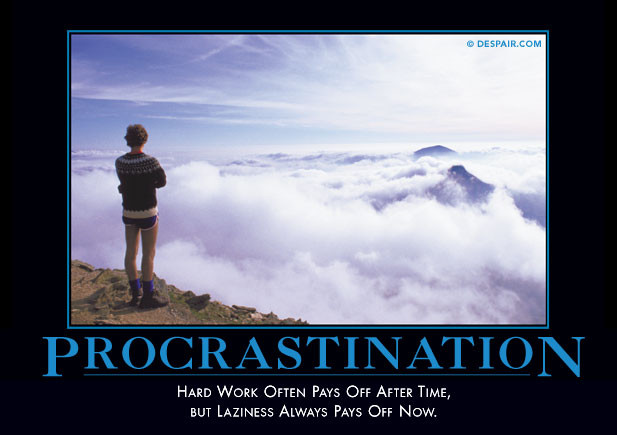Last week, in Part I we covered:
1 – Overwhelming;
2 – Things we don’t enjoy:
A) Anxiety
B) Inadequacy
C) Comparisons
Let’s resume the Mindful path to deal with procrastination.
.
3 – How to deal with our mind’s suffering stories about an activity?
Our mind often fears (A) failure, (B) powerlessness or helplessness or (C) missing out on something else.
.
A) Fear of failure
The fear of failure is the fear of not achieving a best-case scenario.
Also called “Perfectionism”, this leads us not giving our all. We prevent ourselves of giving 100% so that we can have an excuse in case something goes wrong.
The story line here is revolving around an idealized outcome, and the simple possibility of coming short is unbearable.
Since we can’t control every single factor in life, the outcome of our efforts doesn’t mean anything about us. Good outcomes doesn’t mean we’re great and bad outcomes doesn’t mean we’re bad either, because there are always factors, circumstances and details we can’t control.
Cristiano Ronaldo can’t be considered a great football player for scoring 5 goals in one match, and he can’t also be considered a bad football player for scoring an own goal in a match! Maybe the opposite goalkeeper was in a bad day; maybe he’s teammate tried to clear the area and happened to hit Ronaldo’s body for an own goal.
We can only control how hard we practice, and this frees us to try our best. Putting the idea of falling aside results in a decreased need to procrastinate, and an increased response to action.
“How hard do you play when no one is watching?” You can’t fail when you’re doing your best. Aim for your best even when no one is watching.
.
B) Fear of powerlessness or helplessness
Our mind plays a trick on us. It often times says – “You have to do this” – making us feel that we don’t have a choice. This lack of control creates resentment towards tasks we feel forced doing.
The fact is that any action has its opposite reaction, creating an outcome, product or result.
By focusing more on the consequence of our choice we empower ourselves with the control we need. Forget about the dual process of “To do or not to do, that is the question.” That is not the question! The real question is “If I practice I’ll get better. If I don’t practice I’ll be stagnant. So I CHOOSE to practice, I choose getting better.”
No matter what the situation is you always have a choice. Look for all the choices that a situation provides you and choose the one that can give you the best outcomes.
Focus on the results, look ahead and see the benefits of an action. Always choose greatness.
.
C) Fear of missing out on something else
This form of procrastination doesn’t usually prevent people from initiating an activity, but it will interrupt the drive, motivation or will to perform.
“This is a waste of time. This isn’t fun.”
(This is actually a feeling I’m having right now, while I’m writing this post! Isn’t this awesome? Let me look closely to this emergent feeling.)
There’s a big difference between Happiness and Fun.
Fun is a temporary solution, a distraction from thoughts. Since it can’t endure, it will create lack between fun moments and creates suffering moments. A fun moment is simply a distraction shift from your thoughts to something else, because it makes you stop paying attention to them.
Happiness, on the other hand, makes you feel complete and whole, everything is enjoyable and leads you to a life of fulfilment. The sense of peace installs in your core and you experience to be happy in every situation.
Happiness is not the accumulation of fun moments, so stop waiting for another fun moment experience. This brief relief you are seeking only creates a gap of void and suffering in between those happy times.
Eating a whole bucket of ice cream can be very pleasurable, but think about the tummy ache waiting for you in a few hours!
.
4 – How to deal with present suffering through distracting activities
Our physical, mental or emotional pain can knock us down the mat. TV, Facebook, constant Email check, simple activities, mind consuming activities, work avoidance or systematic breaks are symptoms of a larger problem.
Although these activities might give us a little high, a bit of pleasure, they make you hooked up like an addict. You start going to your temporary source of pleasure to escape from pain or sense of lack and you shift your attention away from your feelings and thoughts.
But this kind of problem doesn’t go away with the most determined will power. Here is where this becomes interesting. Forcing yourself to stop behaviours doesn’t work. You wind up repeating the same pattern over and over again. Understanding the reason why you are choosing this behaviour will stop it!
The next time you feel the need to doze off from your meaningful activities ask yourself what are you trying to escape now. Look inwards and find which thoughts are you trying to avoid.
How do you feel when you are pulled to a distraction? Go to the root of your suffering in order to suspend the need to go to distractions again.
.
5 – How to deal with a task that isn’t the right fit for us
If you experience lack of motivation to start or complete a task this activity is not neutral to you. If you avoid it it’s because you believe it’s creating you suffering and you should address to the other 4 reasons why we avoid a task.
A neutral task doesn’t take time or energy for you to complete so go deep inside of you and focus on the real story your thoughts are preventing you from access.
In the end, think about your energy, work and activities has a bottle of your favourite drink. Will you spill it all out, procrastinating pointlessly, or will you drink it vividly, tasting every little sip?
One final friendly thought about this topic: Keep this article close; you will need it one time or another. Every time you feel discouraged resume your reading and navigate through the possibilities. Discover more about yourself and how you react to your own activities, work loads and exciting goals you may set for yourself.
For more on the subject check Noah Elkrief’s work on http://www.liveinthemoment.org/how-to-stop-procrastinating/




